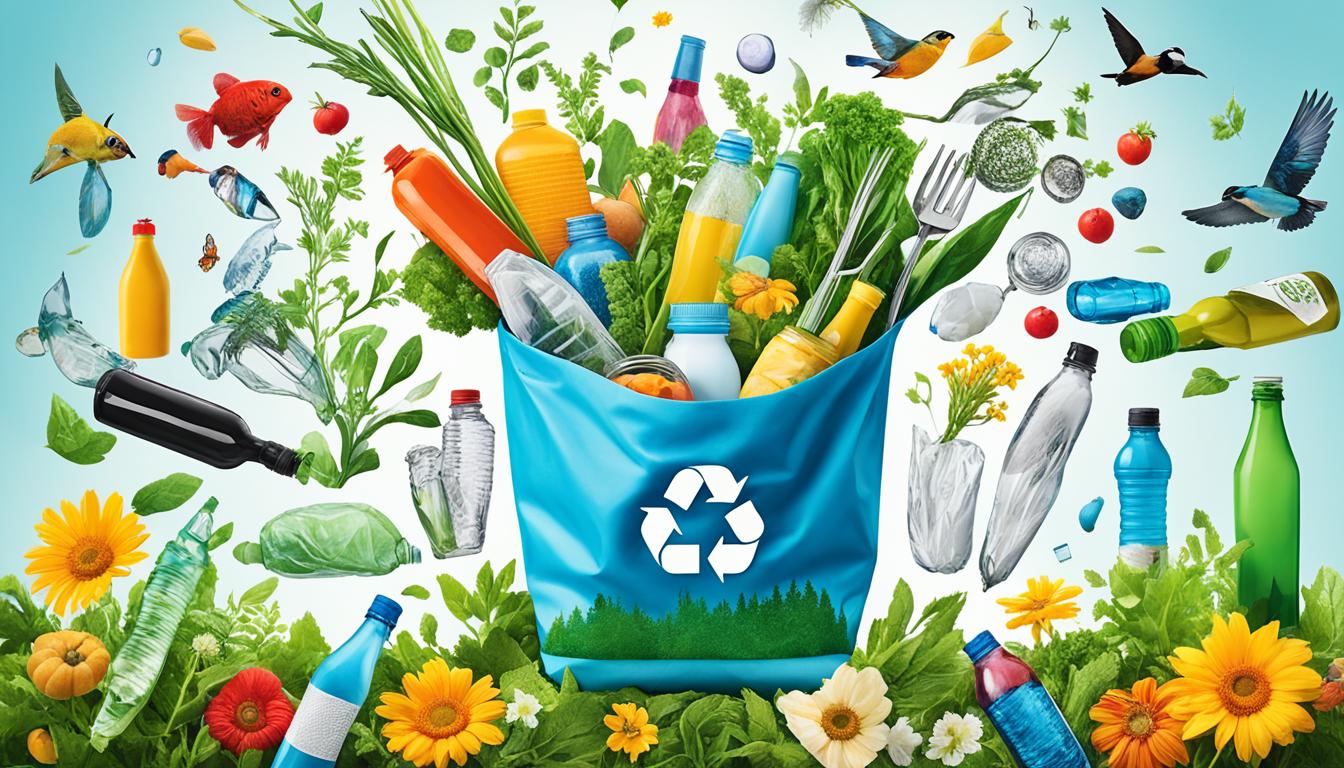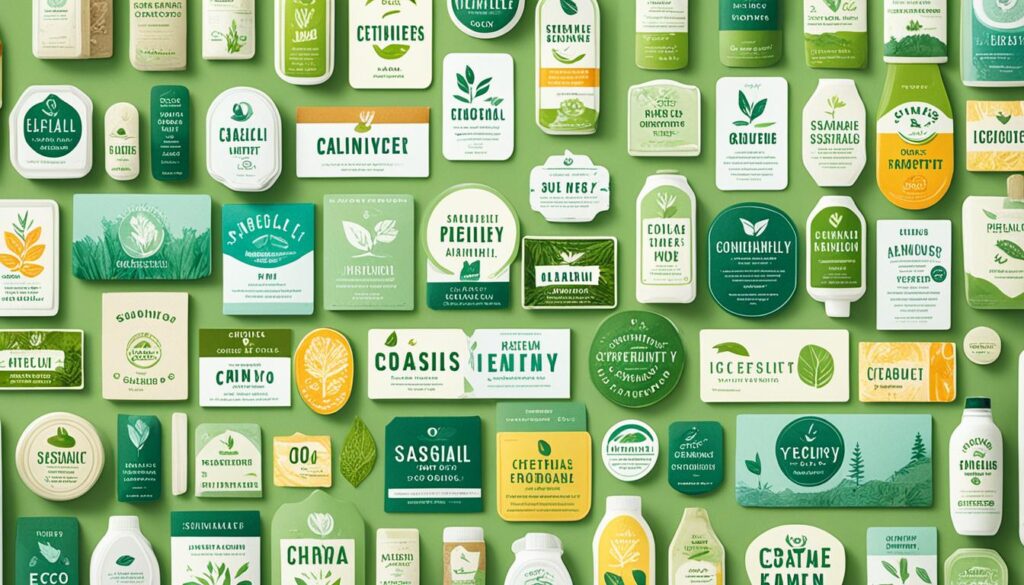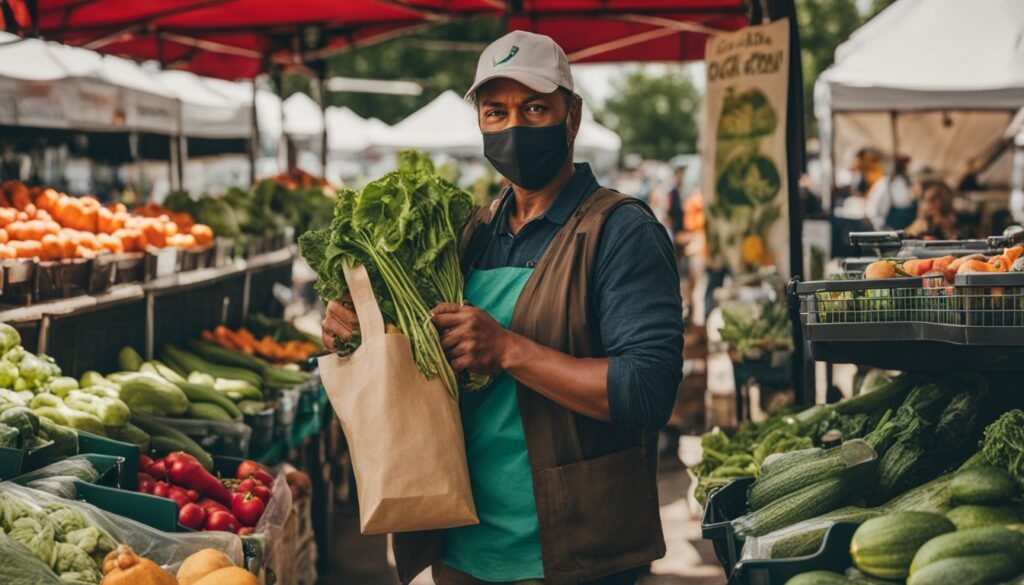Physical Address
304 North Cardinal St.
Dorchester Center, MA 02124
Physical Address
304 North Cardinal St.
Dorchester Center, MA 02124

Mindful Consumption: How to Make Eco-Friendly Shopping Choices. Discover practical tips for sustainable living and conscious purchasing to reduce your environmental impact.
Strolling through my local grocery store, I felt uneasy. The sight of plastic-wrapped produce and towering shelves of single-use items made me pause. I started to question how much of this stuff I really needed. This moment made me realize the impact of mindful consumption. It’s about making choices that meet our needs, reflect our values, and protect the planet.
In today’s world, being mindful of what you buy and living eco-friendly is becoming more common. It’s essential to think about our choices. Choosing green consumerism and ethical shopping means we can live more consciously. Our choices matter for the planet and for future generations.
Mindful consumption is about thinking how our choices affect us, others, and the planet. It means not buying too much just because we can. It’s an important part of caring about the world’s future. People who consume mindfully think before they buy, choosing only what’s really needed.
Being a mindful consumer means looking at the big picture. It’s considering how our choices impact nature, society, and ourselves. This approach helps avoid unnecessary purchases, focusing on what truly matters.
Mindful consumption can make a positive impact. It lets us shop in ways that match our values, helping support good companies. This not only helps the environment but also makes a better, more circular economy.
The perks of being a mindful shopper go far. It can make us happier by valuing what we have. It also pressures companies to think greener. Together, these steps can lead to big changes for the better.
Choosing to shop mindfully can help change the world bit by bit. It’s something we all can do for a greener and fairer planet.
Consumer choices hugely affect the environment. From making products, moving them, and throwing them away, every step adds to the problem. This causes issues like more carbon in the air, less trees, lost homes for animals, and more trash. Knowing how products harm nature helps us pick better ways to shop.
Everything we buy, use, and throw away makes the planet hotter. But, we can cut down on this heat. Choosing things like fridges that use less energy, eating less meat, and picking local shops help a lot. In fact, we can lower our impact by a quarter just by making smart choices.
Getting what we need for products can mean tearing down forests and homes for wildlife. But, we can help. Supporting companies that care for the earth, love recycled stuff, and protect nature in their work makes a difference.
Throwing stuff away, especially plastic we use once, is a big problem. We have the power to change this. Picking products with less trash, using things again when we can, and properly tossing things away through recycling and composting matters a lot.
| Impact Area | Potential Reduction Through Mindful Consumption |
|---|---|
| Carbon Footprint | Up to 25% reduction |
| Plastic Waste | 156 plastic bottles saved annually per individual |
| Food-related Emissions | Up to 4,800 pounds of carbon emissions reduced annually |
| Energy Consumption | Up to 50% reduction in household energy use |
| Greenhouse Gas Emissions from Recycling | 186 million metric tons prevented annually in the U.S. |
Learning about how our choices affect Earth helps us do better. We can choose things that are good for our planet and future.
Understanding ethical product labels and sustainable product labels is key for thoughtful shoppers. Labels like Fair Trade, organic, and cruelty-free show dedication to ethical and sustainable ways. This helps buyers pick items that match their beliefs. They can then back companies that care for the planet and people.
Fair Trade gives a fair deal to workers, ensures safety, and supports eco-friendly methods. Buying Fair Trade products helps make global commerce more ethical. It also boosts the lives of workers in poorer nations.
Organic and non-GMO mean no artificial chemicals or GMOs in farming or making the products. Choosing these items backs earth-friendly farming, saves diversity, and cuts the cost to nature.
Cruelty-free and vegan prove no animal testing or animal parts in the products. Opting for these items supports ethical and sustainable moves. They show care for animals and lower the harm from animal farming.

Consumers who care can figure out the changing world of ethical product labels and sustainable product labels. They can make smart choices that reflect their values. This pushes for a healthier planet and fairer systems.
The danger of single-use plastics to our planet is clear. Things like plastic bags and water bottles make up a lot of what we throw away. Shockingly, 91% of plastic is not recycled. People who care are looking for different options. They are using things again and again, and asking for things to change.
Starting to use less plastic is simple. You can use reusable bags and bottles instead of disposable ones. It also helps if you know how things are made and what happens to them after you use them. Putting things in the right trash or recycling bin makes a big difference.
Talking to store owners can make them offer more eco-friendly choices. This push can help make the economy work in a better way for our planet. Every small change from us when it comes to plastic can really help nature. It’s all about using what we have wisely, so we have a better world in the future.
Being a mindful consumer means looking closely at the brands we choose to support. It’s important to do our homework. We need to know if they are open about their actions, how they treat their workers, and what they do for the planet. This info helps us decide where to spend our money wisely.
Good companies are open about what they’re doing to help the world. They write detailed notes about their efforts to protect the environment, treat people fairly, and make sure they’re doing the right thing. Looking at these reports helps us pick brands that care about the same things we do.
We also care about how a company treats its workers. It’s not just about the money they make. We look into if they work in safe places and have their rights protected. Buying from brands that value their workers helps make things better for everyone.
Choosing companies that work to protect our planet is a top goal for mindful buyers. We check what brands are doing to be green. This includes using clean energy, making less waste, and choosing earth-friendly materials. Their green efforts matter a lot to us.
Focusing on a company’s honesty, how they treat their workers, and what they do for the planet is key for careful shoppers. Our choices push companies to do the right things. This is good for the earth and for all of us living on it.

Second-hand stores play a big part in how we consume. They help us buy used items. This means we give new life to things that might otherwise be thrown out. It’s not just good for our planet. It also makes sure we don’t waste our natural resources on stuff we already have plenty of.
Buying vintage or used clothes is like giving them a second chance. We get unique looks and keep the planet healthier. By shopping this way, we don’t support the harmful practices of fast fashion. Instead, we put less pressure on our environment and give a thumbs down to bad labor conditions. It’s a win for everyone.
When we buy second-hand, we basically slow down the need for new things. This helps lower the waste we produce. Often, making new stuff uses a lot of water and power. Buying used means we don’t need as much of these resources. So, it’s good for Earth and for those who come after us.
Big steps have a small start. Choosing used products over new is one of those small steps. It cuts down the energy we use and the pollution we make. By not picking new, we tell companies we care about how things are made. We support better ways to treat the people who make the stuff we love.
Ever thought about how cool it is to find something no one else has? That’s part of the joy in shopping at second-hand stores. You can find things that match your own style perfectly. Plus, it’s thrilling to know that each piece tells its own story.
Second-hand shopping is not just about the thrill of the find. It’s about saying no to the habit of throwing things away. Often, thrift stores support good causes. So any money we spend there might just be helping someone in need.
Mindful consumption means we shop with care. We think about what we buy. It’s about making conscious purchasing habits. We should put our needs first and look for sustainable alternatives. This helps the planet and lets us buy things that match our values.
To shop mindfully, we must be thoughtful. We look at why we need something, how long it will last, and its effect on Earth. It means looking into products, comparing them, and then choosing wisely based on what’s important to us.
Our world often tells us to buy things quickly. Mindful shopping suggests we put our real needs before our cravings. Figuring out what’s necessary helps us cut down on waste. This mindful approach teaches us patience and the joy of picking things that are good for the environment.
When we look for things to buy, we seek out options that won’t harm the planet. We might go for things we can use more than once. Or we support businesses that make their products in ways that are kind to our world. Choosing these sustainable alternatives lessens our impact on the environment.

The food we eat affects the planet, and many of us care about this. So, we choose food that is made locally and sustainably. Farmer’s markets and CSA programs help us do this. They let us meet local farmers and buy food that doesn’t travel far, cutting down on pollution. This also helps our local economies.
At farmer’s markets and CSA programs, you can talk to the people who grow your food. This ensures you get fresh, seasonal, and not too processed food. Choosing these options helps the environment a lot. It reduces the distance your food travels and its carbon footprint. And, it boosts the local economy by supporting small farmers and craftspeople.
How far your food travels is important. It affects the environment. Foods that are grown or produced near you save a lot of energy and cut down on pollution. This supports farming that cares about the planet and lowers harmful gases in the air.
Picking local food helps your town or city. It supports local farmers and markets. This keeps money in your area and helps it grow. It also makes your area more ready to face challenges in the future. So, buying local food does a lot for your community.

As our world uses more technology, mindful customers are stepping up. They’re looking to apply their eco-friendly ways to tech. They care about the energy used in data centers, how much electronic waste we make, and the impact of frequent tech updates.
To lessen their digital impact, mindful consumers pick devices that are energy savers. This choice helps cut energy costs and lessens greenhouse gases. They also think about e-waste, or electronic junk. They make sure old devices are recycled or used again, keeping them out of dumps.
Mindful customers go further than just saving energy. They like companies that make tech the green way. These companies use recyclable materials and make gadgets that last. By supporting such makers, they lower the need for new tech often. This saves the planet from extra harm.
Mindful customers know that old tech can be risky. They ensure that e-waste is handled the right way. They join in recycling programs and back plans to keep electronics out of dumps. Such steps show their all-around care for the world and their love for tech’s many uses.
Mindful consumption impacts our world greatly and is not done alone. People considering environmental and social effects in their purchases help build a better future. It’s not just about what we buy but living in ways that are kind to our world. This mindset spreads good changes through society and time.
The idea of being mindful in what we buy is gaining traction. People now realize how much harm single-use items like plastics cause. They are choosing to support small, sustainable farms to help. Websites like Scrapiy offer tips on living green. This makes it easier for folks to pick choices that feel right.
Making informed decisions is powerful for shaping a better world. There’s a big push for products that are eco and fair, with many willing to pay more for them. Now, more companies are striving to meet these demands by getting green certifications and making eco-friendly moves. By backing these brands, we can make real change for the better.